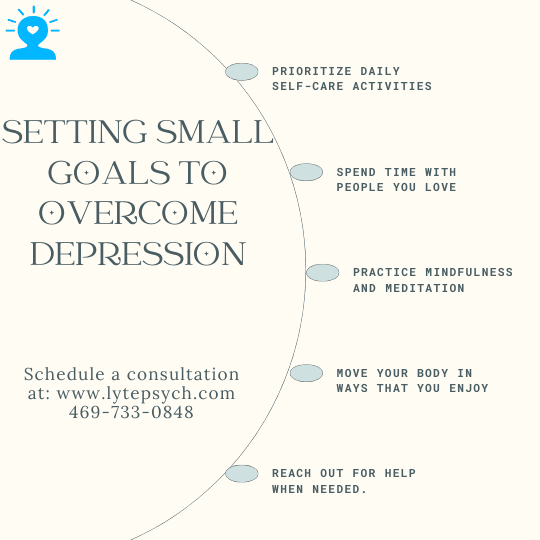Thu Nov 07 2024
How to Set Small Goals to Overcome Depression: 5 Simple Steps at Lyte Psychiatry (Affordable Therapist and Psychiatrist Near You) Best Therapist and Psychiatrist Near You, Dallas TX

How to Set Small Goals to Overcome Depression: 5 Simple Steps at Lyte Psychiatry (Affordable Therapist and Psychiatrist Near You) Dallas,TX
Depression can often make even the simplest tasks feel overwhelming, leading to a sense of hopelessness and inertia. However, setting small, achievable goals can be an effective strategy to combat these feelings and foster a sense of accomplishment and motivation. At Lyte Psychiatry in Dallas, TX, we understand the importance of goal-setting as part of a comprehensive approach to managing depression.
1. Start with Self-Reflection
What areas of my life feel most challenging right now?
Are there specific tasks I’ve been avoiding that I’d like to tackle?
Self-reflection helps identify areas where you want to create change, making it easier to set meaningful goals that resonate with you.
2. Break Down Larger Goals into Smaller, Manageable Steps
If your goal is to exercise regularly, start by committing to a 10-minute walk a few times a week.
By focusing on smaller tasks, you reduce feelings of overwhelm and create a sense of achievement as you complete each step.
3. Set SMART Goals
Specific: Clearly define what you want to achieve. Instead of saying, “I want to exercise more,” specify, “I will walk for 10 minutes every morning.”
Measurable: Ensure you can track your progress. For example, “I will write in my journal three times a week.”
Achievable: Set realistic goals based on your current circumstances. Consider your energy levels and commitments when determining what is feasible.
Time-bound: Establish a timeframe for achieving your goals. For example, “I will complete my 10-minute walk by the end of this week.”
4. Celebrate Small Wins
Recognizing and celebrating your accomplishments, no matter how small, is crucial in maintaining motivation and combating feelings of hopelessness. Take time to acknowledge your progress and reward yourself for achieving your goals. Celebrations can be as simple as treating yourself to a favorite snack, enjoying a relaxing bath, or spending time on a hobby you love.
5. Stay Flexible and Adjust Goals as Needed
Life can be unpredictable, and sometimes goals may need to be adjusted based on changing circumstances or energy levels. It’s essential to remain flexible and kind to yourself if you encounter setbacks. If a goal feels too challenging, consider scaling it back or modifying it to better suit your current situation. Remember, the goal is to create a positive and supportive approach to your mental health journey.
Seek Professional Help at Lyte Psychiatry (Affordable Therapist and Psychiatrist Near You)
Setting small goals is a powerful strategy for overcoming depression and fostering a sense of accomplishment. By starting with self-reflection, breaking down larger goals, using the SMART framework, celebrating your achievements, and remaining flexible, you can gradually regain control over your life and enhance your well-being. At Lyte Psychiatry in Dallas, TX, we are committed to providing affordable and compassionate care for individuals struggling with depression.
To Schedule an appointment. Click Here
To see our services. Click Here
Call us if you have questions at 469-733-0848
FAQ
Q: How do I know if my goals are realistic?
A: Evaluate your current energy levels, commitments, and resources. Start with small, achievable goals, and gradually increase their complexity as you gain confidence.
Q: What if I don’t feel motivated to set goals?
A: It’s common to feel unmotivated when dealing with depression. Consider starting with very small goals or seek support from a mental health professional to help guide you in the goal-setting process.
Q: Can goal-setting really help with depression?
A: Yes, setting and achieving small goals can provide a sense of purpose, accomplishment, and motivation, which can significantly improve mood and overall mental health.
Q: How often should I review my goals?
A: Regularly review your goals to assess progress and make necessary adjustments. This could be weekly, bi-weekly, or monthly, depending on your needs and preferences.
Q: Where can I find support for my mental health journey?
A: At Lyte Psychiatry, we offer comprehensive mental health services, including therapy and medication management, tailored to your unique needs. Don’t hesitate to reach out for support.